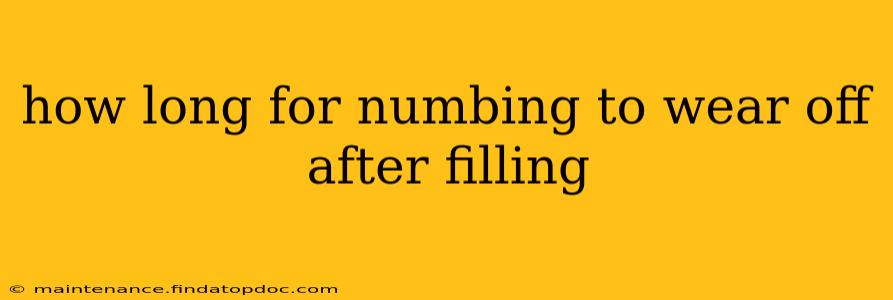Getting a dental filling is a common procedure, but the lingering numbness can be a bit inconvenient. Knowing how long the numbing will last can help you plan your day and avoid any accidental injury. The duration varies depending on several factors, and this guide will explore them in detail.
What Causes the Numbness?
The numbness you experience after a filling is due to the local anesthetic your dentist administers before the procedure. This anesthetic temporarily blocks nerve signals in the treated area, preventing you from feeling pain. Common local anesthetics include lidocaine and articaine. The type and amount of anesthetic used will influence how long the numbness lasts.
How Long Does the Numbing Typically Last?
Generally, the numbing effect from a dental filling lasts between 2 and 12 hours. However, this is just a broad range. Several factors significantly influence the duration:
Factors Affecting the Duration of Numbness:
-
Type and Amount of Anesthetic: As mentioned, different anesthetics have varying durations. Your dentist will choose the most appropriate option based on the procedure's complexity and your individual needs. A larger amount of anesthetic will naturally lead to longer-lasting numbness.
-
Individual Metabolism: How quickly your body processes the anesthetic plays a crucial role. People with faster metabolisms might experience shorter periods of numbness compared to those with slower metabolisms.
-
Injection Site and Technique: The precise location of the injection and the dentist's injection technique can influence how effectively the anesthetic numbs the area and the duration of the effect.
-
Overall Health: Underlying health conditions can sometimes affect how your body responds to the anesthetic. It's always important to inform your dentist about any health issues you have.
-
Type of Filling: While the type of filling itself doesn't directly affect the anesthetic's duration, more extensive procedures might require more anesthetic, thus potentially prolonging the numbness.
What if the Numbness Lasts Longer Than Expected?
While some lingering numbness is normal, prolonged or unusual numbness can be a cause for concern. Contact your dentist if:
- Numbness persists for more than 24 hours. This could indicate a problem with the nerve.
- You experience swelling or significant pain. These symptoms may warrant immediate medical attention.
- You develop a tingling sensation that doesn't subside. This warrants a check-up.
How Can I Manage Post-Numbness Discomfort?
While waiting for the numbness to wear off, be mindful to avoid:
- Chewing on the numb side of your mouth: You could accidentally bite your cheek or lip without realizing it.
- Eating hot foods or drinks: Your numb area might be more sensitive to temperature changes.
- Drinking alcohol: Alcohol can sometimes interact with the anesthetic, prolonging the numbness or causing other side effects.
What Happens if I Bite My Cheek or Lip While Numb?
Accidental biting is a common concern while numb. If this happens, rinse your mouth with warm salt water and apply a cold compress to reduce swelling. If bleeding is significant or the injury is severe, contact your dentist or seek medical attention.
Is it Normal to Have Some Discomfort After the Numbing Wears Off?
Yes, some mild discomfort or soreness is normal after a filling. Your dentist will likely recommend over-the-counter pain relievers such as ibuprofen or acetaminophen to manage any post-procedure pain. However, severe or persistent pain warrants a call to your dentist.
By understanding the factors influencing the duration of numbness and taking precautions, you can better manage the post-filling experience and ensure a smooth recovery. Always communicate with your dentist if you have any concerns or experience unusual symptoms.
